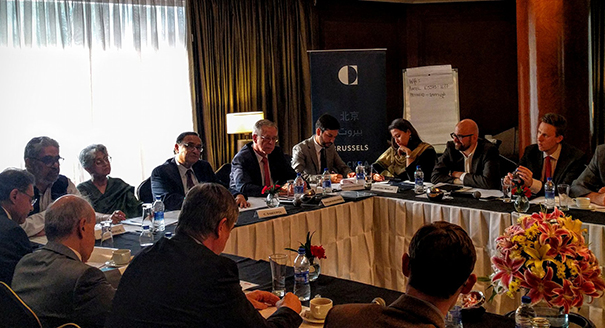Registration
You will receive an email confirming your registration.
Carnegie India, in collaboration with the Global Public Policy Institute, hosted the second EU-India Public Policy Dialogue on Global Governance and Security. This event was held in the context of the EU-India Think Tank Initiative 2016, sponsored by the EU Delegation of the European Union to India and implemented by a consortium led by Development Alternatives, Inc. (DAI) , in cooperation with the European Policy Centre (EPC) and the EU-Asia Centre (EUAC).
European and Indian experts focused on new avenues for collaboration between the EU and India and practical ways of updating the strategic partnership. The workshop was designed to maximize interaction between approximately thirty think-tank experts and officials from New Delhi and Brussels and featured two parallel working groups on cooperation in maritime security and international peace operations
Following the private day-long deliberations, a High Tea reception was hosted featuring keynote addresses on the future of EU-India cooperation in global governance and security. The ambassador of the EU delegation to India H.E. Ambassador Tomasz Kozlowski presented the European view on the potential for closer cooperation, and H.E. Ms. Sujata Mehta, Secretary (West), Ministry of External Affairs, presented the Indian perspective on strengthening the EU-India relationship. Ambassador Chandrashekhar Dasgupta, former Indian ambassador to the European Union, chaired the session, which was attended by over a dozen ambassadors from EU member states to India.
Discussion Highlights
- Shared Interests and Threat Perceptions in Maritime Security: The European Union Maritime Security Strategy (2014) spells out EU’s interests in maritime security, participants said, citing specific interests such as territorial security, international maritime cooperation and peace, protection of critical maritime infrastructure, freedom of navigation, protection of economic interests at sea, common situational awareness, effective management of EU’s maritime areas and external borders, and environmental security. To this end, they explained that the EU has developed a series of initiatives in the Indian Ocean region that complement India’s Maritime Strategy (2015), that focuses on strengthening maritime domain awareness in the Indian Ocean region, and increasing naval engagements to build a favorable maritime environment.
- Areas for Cooperation: The working group members felt that the EU and India can promote stability, peace and development in an open Indian Ocean order by working together in the areas of maritime multilateralism, domain awareness, the development of the blue economy, regional connectivity and in the promotion of legal approaches to conflict resolution under a rules-based order.
- Shared Responsibility for Global Security: The EU-India strategic partnership as well as the Joint Action Plan identify “peacekeeping, conflict resolution, and post-conflict assistance” as important areas of cooperation within the broader context of Indo-European relations, participants said. They explained that the rationale behind the EU’s decision to enhance cooperation in these areas with India to a strategic level rested on two premises: first, that India, as a democracy and emerging global power, shares the same notion of responsibility for global security, and second, that a shared interest in the effective multilateralism means India is a natural partner to work with at the UN on conflict prevention and peacekeeping.
- Obstacles to Cooperation: While the EU and India agree that they both need to act as responsible powers in the international system, the working group felt that they did not always have similar perceptions of what it means to act responsibly. While the European Union prefers that its military and civilian contingents serve in EU missions, India is not yet ready to deviate from its traditional position of participating only in UN-led missions. The working group was divided on how the cooperation measures specified in the Joint Action Plan, including training of staff, personnel exchanges, and combined post-conflict projects, can be achieved. Some argued that a step-by-step approach needs to be followed. This would begin with knowledge sharing and capacity building, then progress to civilian cooperation in non-lethal areas, and finally advance to cooperating in combat areas where the EU and India already maintain a presence and have mutual interests. Despite consensus on deepening cooperation, the working group members agreed that one major challenge is to better understand domestic debates and concerns on both sides, in order to change mindsets and bolster convergence.
This event summary was prepared by Arushi Kumar, a research assistant at Carnegie India.
